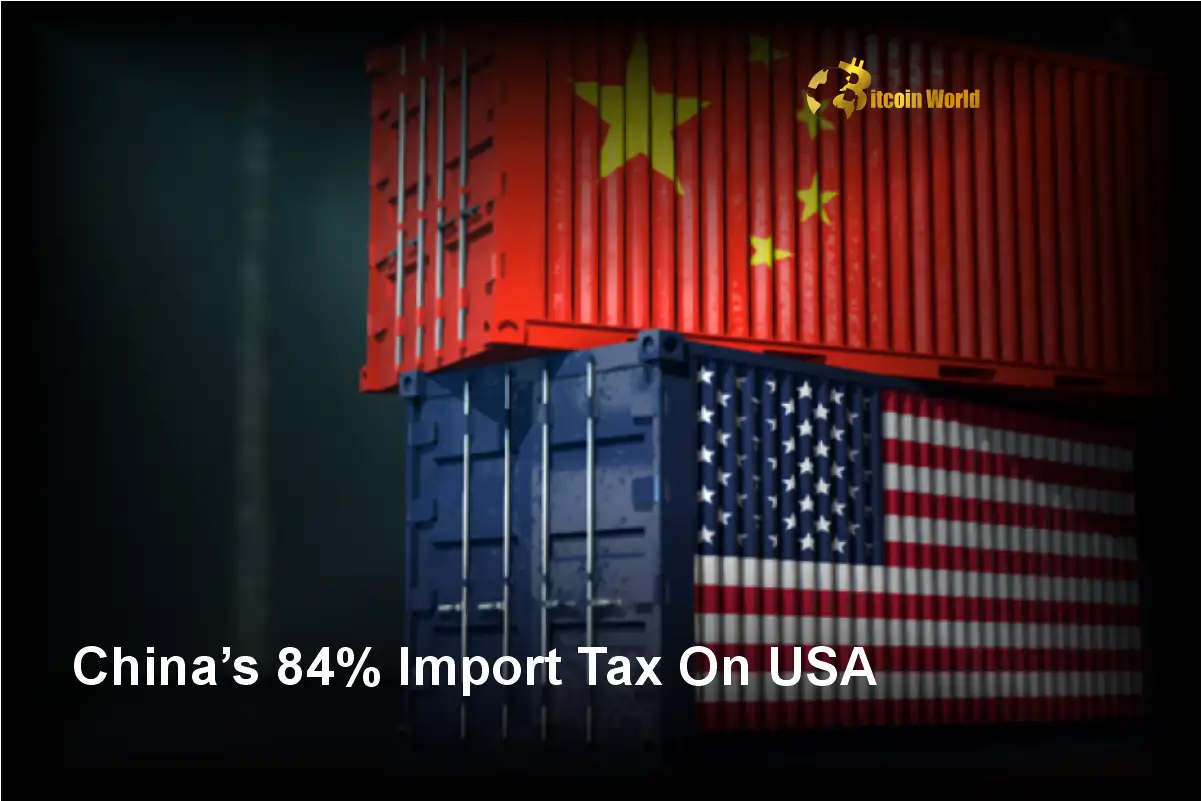Are you ready for a potential earthquake in global trade? Just when we thought the economic landscape was settling, news has broken that could send ripples across financial markets, potentially impacting everything from traditional stocks to the volatile crypto sphere. A recent report from Walter Bloomberg on X (formerly Twitter) suggests that China’s Ministry of Finance is considering slapping a massive 84% tariff on goods imported from the United States. Let’s dive into what this could mean for the global economy and your investments.
Understanding the Proposed China Tariffs on US Imports
According to reports circulating on social media, specifically from the well-known financial news source Walter Bloomberg, China is contemplating a significant escalation in trade tensions with the U.S. The proposed measure involves imposing additional tariffs that could reach a staggering 84% on goods flowing from the United States into China. This isn’t just a minor adjustment; it’s a potentially seismic shift in the economic relationship between the world’s two largest economies.
Key Points to Consider:
- Source of the News: The information originates from Walter Bloomberg on X, a source known for disseminating real-time financial news and market updates. While not an official government announcement, Bloomberg’s reports often carry weight and are closely watched by market participants.
- Magnitude of the Tariffs: An 84% tariff is exceptionally high. To put this into perspective, typical tariffs are often in the single or low double-digit percentages. Such a drastic increase signals a potentially aggressive stance from China.
- Scope of Impact: These tariffs, if implemented, would apply to goods imported from the U.S. The exact list of goods isn’t specified in the initial report, but a broad application could affect a wide range of American exports to China, from agricultural products to manufactured goods.
Why are China Tariffs on US Imports Being Considered?
While the exact reasons behind this potential tariff hike are not explicitly stated in the initial report, we can speculate on some likely contributing factors:
- Retaliation: Trade relations between the U.S. and China have been strained for years, marked by a series of tariffs and counter-tariffs. This move could be seen as a retaliatory measure against existing or anticipated trade actions from the United States.
- Economic Leverage: Tariffs are a tool of economic leverage. By increasing tariffs, China could be aiming to pressure the U.S. to reconsider its trade policies or to gain an advantage in ongoing trade negotiations.
- Domestic Economic Strategy: Imposing tariffs can also be a way to protect domestic industries. By making U.S. imports more expensive, China might be seeking to encourage domestic consumption and production.
- Geopolitical Tensions: Trade is often intertwined with broader geopolitical relations. Escalating trade tensions could be a reflection of, or a tool in, wider geopolitical maneuvering between the two nations.
Trade War Impact: What Could Be the Repercussions?
If China proceeds with these 84% tariffs, the trade war impact could be significant and multifaceted:
Economic Consequences:
- For the U.S.: American exporters would face a massive barrier to the Chinese market. This could lead to decreased sales, reduced profits, and potentially job losses in export-oriented industries. Certain sectors, like agriculture and manufacturing, could be particularly vulnerable.
- For China: While aiming to protect domestic industries, China could also face consequences. Increased import costs could lead to inflation, potentially impacting consumers and businesses that rely on U.S. goods. It could also disrupt supply chains and affect China’s own export competitiveness in the long run.
- Global Economy: A major escalation in US-China trade tensions can send shockwaves through the global economy. It could disrupt global supply chains, increase uncertainty, dampen investor sentiment, and potentially slow down global economic growth.
Financial Market Reactions:
- Stock Markets: Expect volatility in stock markets, particularly in companies with significant exposure to US-China trade. Sectors like technology, agriculture, and industrials could see pronounced reactions.
- Currency Markets: Currency fluctuations are likely. The Chinese Yuan and the US Dollar could both experience volatility as investors react to the shifting trade landscape.
- Commodity Markets: Commodity prices could be affected, depending on the specific goods targeted by the tariffs. For example, agricultural commodities like soybeans or corn could see price swings.
- Crypto Markets: In times of economic uncertainty, some investors turn to alternative assets like cryptocurrencies. A significant trade war escalation could potentially drive some capital into crypto, but it could also increase overall market risk aversion, leading to volatility across all asset classes, including crypto.
Navigating the Financial Markets Amidst Trade Uncertainty
For investors and businesses operating in the financial markets, navigating this period of trade uncertainty requires vigilance and a strategic approach:
- Stay Informed: Keep a close watch on developments. Follow reputable financial news sources for updates on trade negotiations, official announcements, and market reactions.
- Diversify Investments: Diversification is crucial in volatile times. Spread your investments across different asset classes and geographies to mitigate risk.
- Assess Portfolio Exposure: Understand your portfolio’s exposure to companies and sectors that are likely to be directly affected by US-China trade tensions.
- Consider Risk Management Strategies: Explore hedging strategies to protect your portfolio from potential downside risks.
- Long-Term Perspective: While short-term volatility is expected, maintain a long-term perspective. Economic cycles and trade relations evolve over time.
Is This the Start of a Deeper Economic Conflict?
The potential imposition of 84% tariffs raises serious questions about the future of US-China economic relations. Is this a negotiating tactic, or does it signal a more profound shift towards economic decoupling or a full-blown trade war? The coming weeks and months will be crucial in determining the trajectory. Businesses and investors need to be prepared for a potentially turbulent period in global trade and financial markets.
This situation underscores the interconnectedness of the global economy and how trade policies in major economies like the U.S. and China can have far-reaching consequences. Whether you are a crypto enthusiast, a stock market investor, or a business owner, understanding these developments is vital for making informed decisions in today’s complex economic environment.
Actionable Insights:
- Monitor Trade News: Regularly check for updates from financial news outlets and trade organizations.
- Review Investment Strategy: Reassess your portfolio’s risk profile in light of potential trade escalations.
- Prepare for Volatility: Expect increased volatility in financial markets and be ready to adjust your strategies as needed.
- Seek Professional Advice: Consult with financial advisors to get personalized guidance on navigating trade uncertainty.
Conclusion: Navigating the Uncertain Waters of Global Trade
The news of potential 84% tariffs from China on US imports is a stark reminder of the fragility of global trade and the ever-present risk of economic tensions. While the situation is still developing, and official confirmation is awaited, the potential implications are too significant to ignore. Staying informed, being prepared for market volatility, and adopting a strategic approach to investments are key to navigating these uncertain waters. The global economic landscape is constantly shifting, and adaptability is paramount for success in this dynamic environment.
To learn more about the latest global economic trends, explore our article on key developments shaping global financial markets and economic policies.
Disclaimer: The information provided is not trading advice, Bitcoinworld.co.in holds no liability for any investments made based on the information provided on this page. We strongly recommend independent research and/or consultation with a qualified professional before making any investment decisions.





